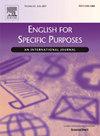Can digital multimodal composition facilitate content learning in a CLIL context? Insights from students’ composing processes in a legal English course
IF 2.7
1区 文学
Q1 LINGUISTICS
引用次数: 0
Abstract
This study explores the role of digital multimodal composing (DMC) in facilitating disciplinary content learning within a content and language integrated learning (CLIL) context, focusing on a legal English course for tertiary-level English majors. While prior research on DMC has primarily emphasized language teaching, limited attention has been given to its potential for supporting subject knowledge acquisition in content-based courses. Drawing on data from students’ composing processes, learning outcomes, and post-learning reflections, the study examines when and how DMC influences content learning. The findings reveal that content engagement varies across the DMC process. The early stages, such as topic selection and planning, involve intensive disciplinary learning, while the scripting stage requires students to synthesize, rephrase, and communicate specialized knowledge for a lay audience, fostering both content retention and language acquisition. In contrast, the later stages—shooting, editing, and finalizing—shift the focus to multimodal composing with limited explicit content learning. The study also demonstrates that DMC projects enhance subject knowledge by promoting conceptual integration, extension, and discovery, while enabling students to apply, recontextualize, and engage with disciplinary literacy in authentic scenarios. The study suggests that DMC, with appropriate scaffolding, is an effective tool for integrating content and language learning in higher education CLIL contexts.
数字多模态作文能促进CLIL语境下的内容学习吗?法律英语课程中学生写作过程的感悟
本研究探讨了在内容和语言综合学习(CLIL)的背景下,数字多模态排版(DMC)在促进学科内容学习中的作用,重点是针对高等英语专业的法律英语课程。虽然先前对DMC的研究主要强调语言教学,但很少关注它在基于内容的课程中支持学科知识获取的潜力。根据学生写作过程、学习成果和学习后反思的数据,该研究考察了DMC何时以及如何影响内容学习。研究结果显示,在整个DMC过程中,内容参与度各不相同。早期阶段,如主题选择和计划,涉及密集的学科学习,而脚本阶段要求学生为外行观众综合,重新措辞和交流专业知识,促进内容保留和语言习得。相比之下,后期阶段-拍摄,编辑和定稿-将重点转移到多模态组合,有限的明确内容学习。该研究还表明,DMC项目通过促进概念整合、扩展和发现来增强学科知识,同时使学生能够在真实场景中应用、重新情境化和参与学科素养。研究表明,在高等教育CLIL语境下,DMC在适当的框架下是整合内容和语言学习的有效工具。
本文章由计算机程序翻译,如有差异,请以英文原文为准。
求助全文
约1分钟内获得全文
求助全文
来源期刊

English for Specific Purposes
LINGUISTICS-
CiteScore
5.70
自引率
8.00%
发文量
41
审稿时长
62 days
期刊介绍:
English For Specific Purposes is an international peer-reviewed journal that welcomes submissions from across the world. Authors are encouraged to submit articles and research/discussion notes on topics relevant to the teaching and learning of discourse for specific communities: academic, occupational, or otherwise specialized. Topics such as the following may be treated from the perspective of English for specific purposes: second language acquisition in specialized contexts, needs assessment, curriculum development and evaluation, materials preparation, discourse analysis, descriptions of specialized varieties of English.
 求助内容:
求助内容: 应助结果提醒方式:
应助结果提醒方式:


